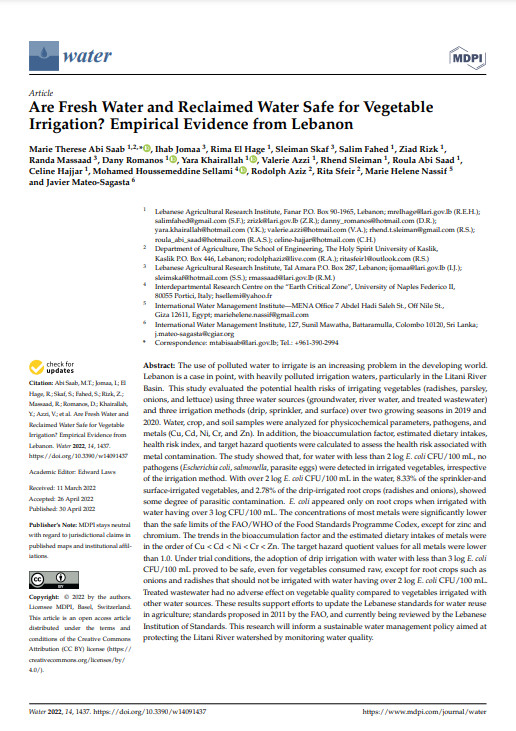Are Fresh Water and ReclaimedWater Safe for Vegetable Irrigation? Empirical Evidence from Lebanon
 |
dossier, étude Apr 2022 ; 23 pages
Aut. Marie Thérèse Abi Saab
Ed. LARI - Zahle
Téléchargeable sous format: PdF
Abstract:
The use of polluted water to irrigate is an increasing problem in the developing world. Lebanon is a case in point, with heavily polluted irrigation waters, particularly in the Litani River Basin.
This study evaluated the potential health risks of irrigating vegetables (radishes, parsley, onions, and lettuce) using three water sources (groundwater, river water, and treated wastewater) and three irrigation methods (drip, sprinkler, and surface) over two growing seasons in 2019 and 2020. Water, crop, and soil samples were analyzed for physicochemical parameters, pathogens, and metals (Cu, Cd, Ni, Cr, and Zn). In addition, the bioaccumulation factor, estimated dietary intakes, health risk index, and target hazard quotients were calculated to assess the health risk associated with metal contamination.
Publics-Cibles:
Mots clefs: |
eaux usées (réutilisation) (CI) (DT) (OP) (ope) , irrigation (CI) (DT) (OP) (ope) , qualité des eaux (CI) (DT) (OP) (ope) , utilisation de l'eau (CI) (DT) (OP) (ope) |
Pays concerné: |
Editeur/Diffuseur: |
|
LARI
-
Lebanese Agricultural Research Institute - Zahle - Liban |
En cas de lien brisé, nous le mentionner à communication@pseau.org